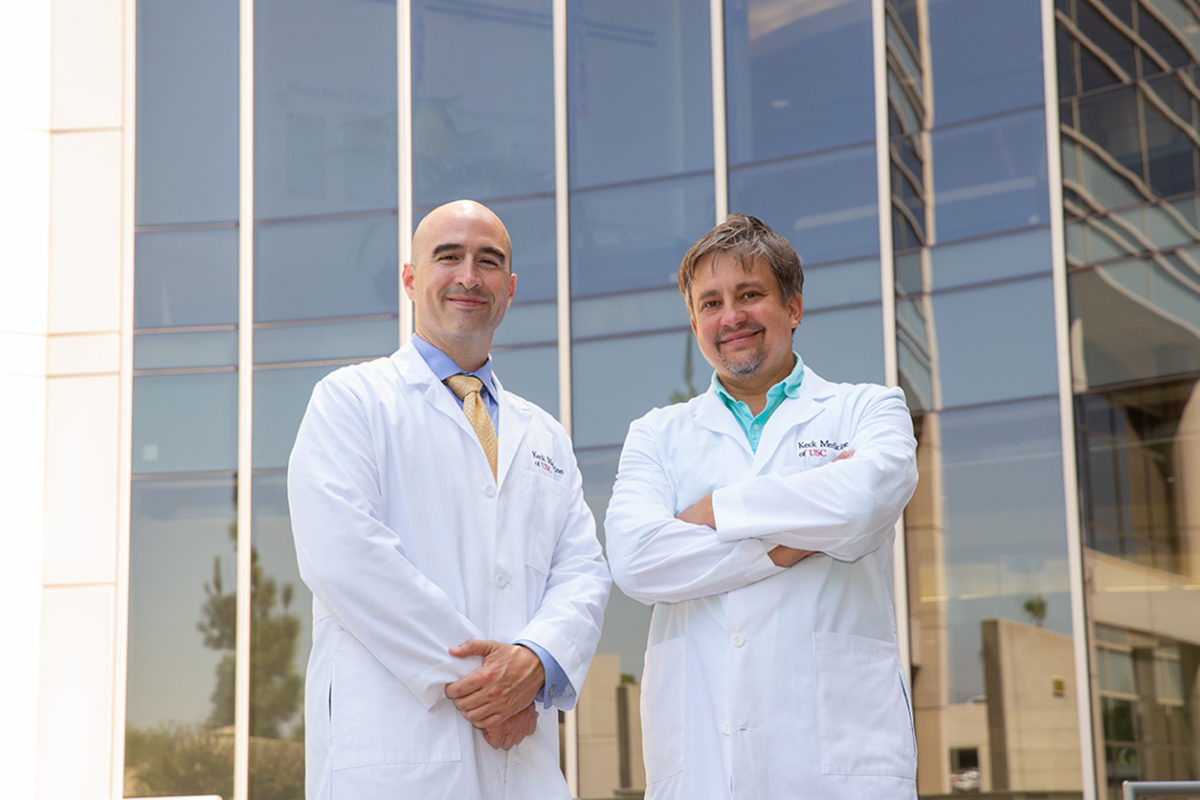
A novel off-the-shelf bio-implant containing embryonic stem cells has the potential to revolutionize the treatment of cartilage injuries
More than a million Americans undergo knee and hip replacements each year. It’s a last resort treatment for pain and mobility issues associated with osteoarthritis, a progressive disease caused by degeneration of the protective layer of cartilage that stops our bones grinding together when we sit, stand, write, or move around.
But what if doctors could intervene and repair damaged cartilage before surgery is needed?
For the first time, researchers at the Keck School of Medicine of USC have used a stem cell-based bio-implant to repair cartilage and delay joint degeneration in a large animal model. The work will now advance into humans with support from a $6 million grant from the California Institute of Regenerative Medicine (CIRM).
The research, recently published in npj Regenerative Medicine, was led by two researchers at the Keck School of Medicine of USC: Denis Evseenko, MD, PhD, associate professor of orthopaedic surgery, and stem cell biology and regenerative medicine, director of the skeletal regeneration program, and vice chair for research of orthopaedic surgery; and Frank Petrigliano, MD, associate professor of clinical orthopaedic surgery and chief of the USC Epstein Family Center for Sports Medicine.
Osteoarthritis occurs when the protective cartilage that coats the ends of the bones breaks down over time, resulting in bone-on-bone friction. The disorder, which is often painful, can affect any joint, but most commonly affects those in our knees, hips, hands and spine.
To prevent the development of arthritis and alleviate the need for invasive joint replacement surgeries, the USC researchers are intervening earlier in the disease.
“In some patients joint degeneration starts with posttraumatic focal lesions, which are lesions in the articular (joint) cartilage ranging from 1 to 8 cm2 in diameter,” Evseenko said. “Since these can be detected by imaging techniques such as MRI, this opens up the possibility of early intervention therapies that limit the progression of these lesions so we can avoid the need for total joint replacement.”
That joint preservation technology developed at USC is a therapeutic bio-implant, called Plurocart, composed of a scaffold membrane seeded with stem cell-derived chondrocytes—the cells responsible for producing and maintaining healthy articular cartilage tissue. Building on previous research to develop and characterize the implant, the current study involved implantation of the Plurocart membrane into a pig model of osteoarthritis. The study resulted in the long-term repair of articular cartilage defects.
“This is the first time an orthopaedic implant composed of a living cell type was able to fully integrate in the damaged articular cartilage tissue and survive in vivo for up to six months,” Evseenko said. “Previous studies have not been able to show survival of an implant for such a long time.”
Evseenko said molecular characterization studies showed the bio-implant mimicked natural articular cartilage, with more than 95 percent of implanted cells being identified as articular chondrocytes. The cartilage tissue generated was also biomechanically functional—both strong enough to withstand compression and elastic enough to accommodate movement without breaking.
With support from the $6 million translational grant from CIRM, the researchers are using this technology to manufacture the first 64 Plurocart implants to be tested in humans.
“Many of the current options for cartilage injury are expensive, involve complex logistical planning, and often result in incomplete regeneration,” said Petrigliano. “Plurocart represents a practical, inexpensive, one-stage therapy that may be more effective in restoring damaged cartilage and improve the outcome of such procedures.”
